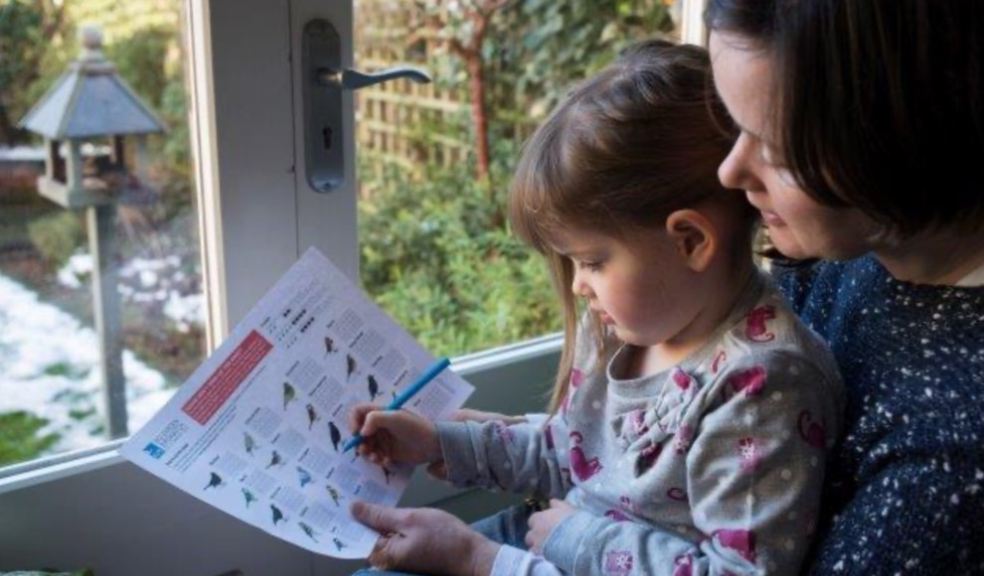
Garden birds in Devon are counting on you!
RSPB’s Big Garden Birdwatch is the largest garden wildlife survey in the world and provides a snapshot of how garden birds are faring in the UK.
The world’s largest garden wildlife survey returns this month, with hundreds of thousands of people watching and counting the UK’s garden birds over the last weekend in January for the RSPB’s Big Garden Birdwatch.
Nearly 700,000 people took part in 2022, counting 11 million birds. In Devon, nearly 18,500 people joined in.
This year’s event takes place on 27, 28 and 29 January 2023. People in Devon are asked to spend just one hour watching and recording the birds in their garden, balcony or local park, then send their results to the RSPB.
This year marks the 44th Big Garden Birdwatch. Starting in 1979, it has since become a much-loved annual event, that helps give the RSPB a valuable snapshot of how our garden birds are doing in the UK.
Over that time, 172 million birds have been counted and nearly 11 million hours spent watching garden birds.
Beccy Speight, the RSPB’s Chief Executive, said: “The birds we see in our gardens, from our balconies, and in our parks, are a lively, colourful and endlessly fascinating part of all our lives, offering a real connection to the natural world.
“By taking part in the Birdwatch you, and hundreds of thousands like you, play an important role in helping us understand how UK birds are doing.
“With birds now facing so many challenges due to the nature and climate emergency, every count matters. Join us for Big Garden Birdwatch 2023 and together let’s take action to protect and preserve our birds and wildlife for generations to come.”
Last year, the house sparrow was top of Devon’s rankings as the most commonly seen garden bird. The blue tit and blackbird completed the top three.
Across the UK, the house sparrow was the most commonly seen garden bird during the Big Garden Birdwatch, with more than 1.7 million recorded sightings in 2022. Blue tit and starling remained in the number two and three positions respectively.
Over its four decades, Big Garden Birdwatch has highlighted the winners and losers in the garden bird world. It was first to alert the RSPB to the decline in song thrush numbers, which are down a shocking 81% compared to the first Big Garden Birdwatch in 1979.
This species was a firm fixture in the top 10 in 1979, but by 2009, its numbers were less than half those recorded in 1979. It came in at 20 in the rankings last year, seen in just 8% of gardens. [note 3]
To take part in the Big Garden Birdwatch 2023, watch the birds on your balcony, in your garden or in your local green space for one hour at some point over the three days. Only count the birds that land, not those flying over. Record the highest number of each bird species you see at any one time – not the total you see in the hour.
Beccy added: “Whatever you see - one blackbird, 20 sparrows or no birds at all - it all counts. It helps us build that vital overall picture of how our garden birds are faring from one year to the next. With so much challenging our birds now, it’s more important than ever to submit your results. Our garden birds are counting on you!”
The parallel event, RSPB Big Schools’ Birdwatch, takes place during the first half of spring term, 6 January – 20 February 2023. In 2021, it celebrated its 20th anniversary of connecting children with nature in their school grounds. Since its launch, over a million school children and teachers have taken part. Further information can be found at www.rspb.org.uk/schoolswatch
For your FREE Big Garden Birdwatch guide, which includes a bird identification chart, top tips for your birdwatch, RSPB shop voucher, plus advice on how to help you attract wildlife to your garden, text BIRD to 70030 or visit www.rspb.org.uk/birdwatch
Registration for Big Garden Birdwatch 2023 is now open.













